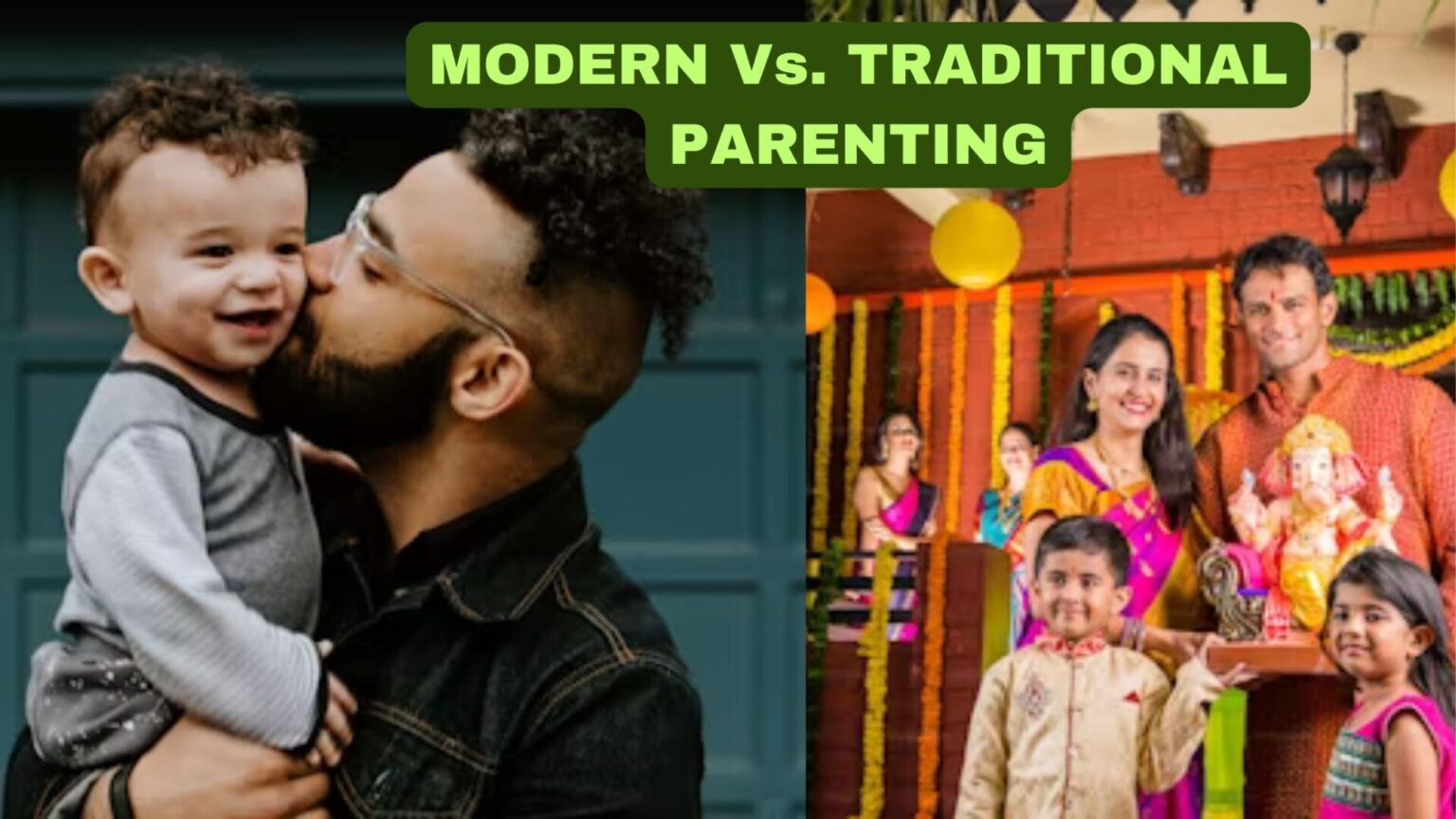Introduction:-
Traditional vs. Modern Parenting: Unveiling the Pros and Cons for Your Child’s Future

In the intricate web of parenting philosophies, the dichotomy between traditional and modern approaches looms large, each offering its unique set of advantages and drawbacks. As parents, navigating this labyrinth can be daunting, with the ultimate concern resting on what best serves our children’s future. Let’s delve into the depths of traditional and modern parenting, dissecting their merits and demerits to illuminate the path forward for your child.
What are the pros and cons of traditional parenting compared to modern parenting?
Traditional Parenting: Embracing Time-Tested Values
In the realm of traditional parenting, time-honored values and practices reign supreme. Rooted in cultural norms, familial legacies, and generational wisdom, this approach emphasizes discipline, respect for authority, and adherence to established customs. Traditional parents often prioritize structure and routine, instilling a sense of orderliness and responsibility in their children from an early age.
Pros:
- Cultural Continuity: Traditional parenting fosters a deep connection to cultural heritage, passing down rituals, languages, and customs that anchor a child’s identity.
- Stability and Security: Consistency and routine provide a stable foundation for children, offering a sense of security and predictability in an ever-changing world.
- Resilience: Traditional values like perseverance, hard work, and resilience are often ingrained, equipping children with the tools to navigate challenges and setbacks.
Cons:
- Rigidity: The rigidity of traditional parenting may stifle individuality and creativity, inhibiting a child’s ability to think critically and adapt to novel situations.
- Gender Stereotypes: Traditional gender roles may be perpetuated, limiting opportunities and imposing societal expectations that hinder personal development.
- Resistance to Change: In a rapidly evolving society, adherence to rigid traditions may impede a child’s ability to embrace innovation and progress.
Modern Parenting: Navigating the Complexities of Contemporary Life
Contrary to its traditional counterpart, modern parenting embraces innovation, flexibility, and a progressive outlook. Grounded in psychological research, contemporary parenting methodologies prioritize emotional intelligence, autonomy, and open communication. Modern parents often advocate for a child-centered approach, valuing individual expression and self-discovery.
Pros:
- Adaptability: Modern parenting encourages flexibility and adaptation, empowering children to navigate diverse environments and embrace change with resilience.
- Emotional Intelligence: Fostering emotional awareness and empathy, modern parenting equips children with vital interpersonal skills crucial for success in personal and professional realms.
- Critical Thinking: Encouraging independent thought and problem-solving, modern parenting cultivates a mindset geared towards innovation, creativity, and analytical reasoning.
Cons:
- Overindulgence: The emphasis on autonomy and individuality may lead to overindulgence and a sense of entitlement, potentially hindering the development of self-discipline and accountability.
- Digital Distractions: In an increasingly digitized world, modern parenting faces the challenge of balancing technology use with real-world experiences, guarding against the adverse effects of excessive screen time and social media exposure.
- Lack of Boundaries: Without clear boundaries and structure, modern parenting approaches may inadvertently foster a sense of chaos and insecurity, leaving children ill-equipped to cope with adversity and uncertainty.
“What are the key differences between traditional and modern parenting philosophies?”
Traditional and modern parenting philosophies have distinct approaches and values. Here are some key differences between the two:

- Authority and Discipline:
- Traditional parenting tends to emphasize respect for authority figures, such as parents and elders, and places a strong emphasis on discipline and obedience.
- Modern parenting often focuses more on collaboration and negotiation, allowing children to have a say in decision-making and encouraging them to express their opinions.
- Roles and Gender Expectations:
- Traditional parenting may adhere more strictly to traditional gender roles, with defined expectations for boys and girls.
- Modern parenting tends to be more egalitarian, challenging traditional gender norms and encouraging children to explore a wider range of interests and activities regardless of gender.
- Communication Styles:
- Traditional parenting may involve more one-way communication, with parents primarily giving instructions and expecting compliance.
- Modern parenting emphasizes open communication and active listening, encouraging parents to engage in dialogue with their children and validate their feelings and perspectives.
- Independence and Autonomy:
- Traditional parenting may prioritize conformity and adherence to cultural or familial norms, with less emphasis on individual autonomy.
- Modern parenting values independence and autonomy, encouraging children to make their own choices and learn from their experiences, even if it means deviating from traditional expectations.
- Education and Achievement:
- Traditional parenting often places a strong emphasis on academic achievement and success, with high expectations for performance and achievement.
- Modern parenting may prioritize holistic development, valuing emotional intelligence, creativity, and personal fulfillment alongside academic success.
- Discipline and Punishment:
- Traditional parenting may rely more on punitive measures such as spanking or corporal punishment as a means of discipline.
- Modern parenting tends to focus on positive discipline techniques, such as redirection, logical consequences, and positive reinforcement, to teach children appropriate behavior.
- Adaptability and Flexibility:
- Traditional parenting may be more rigid and rule-based, with less flexibility to adapt to changing circumstances or individual differences.
- Modern parenting values flexibility and adaptability, recognizing that every child is unique and may require different approaches to parenting.
How can parents ensure they’re making the best choices for their child’s future in today’s world?
Ensuring that parents are making the best choices for their child’s future in today’s world involves a combination of factors including understanding the child’s needs, staying informed about current trends and challenges, and adopting a flexible and supportive parenting approach. Here are some strategies parents can use:

- Know Your Child: Understand your child’s strengths, weaknesses, interests, and temperament. Tailor your parenting approach to meet their individual needs and preferences.
- Stay Informed: Keep up to date with current trends, issues, and challenges facing children and families in today’s world. This includes technology, education, health, and social issues.
- Encourage Exploration: Provide opportunities for your child to explore different interests, hobbies, and activities. Support their curiosity and encourage them to pursue their passions.
- Promote Critical Thinking: Teach your child critical thinking skills and encourage them to question, analyze, and evaluate information. Help them develop the ability to think independently and make informed decisions.
- Foster Resilience: Help your child develop resilience and coping skills to navigate challenges and setbacks. Encourage them to persevere in the face of obstacles and learn from failures.
- Emphasize Emotional Intelligence: Teach your child emotional intelligence skills such as self-awareness, empathy, and effective communication. Help them understand and manage their emotions in healthy ways.
- Promote Diversity and Inclusion: Teach your child to value diversity and embrace differences. Foster an inclusive environment where everyone feels respected and valued.
- Set Realistic Expectations: Encourage your child to strive for excellence but also recognize their limitations and the importance of balance. Help them set realistic goals and manage expectations.
- Model Positive Behavior: Be a positive role model for your child by demonstrating kindness, empathy, resilience, and good decision-making. Your actions speak louder than words.
- Stay Connected: Maintain open lines of communication with your child and stay involved in their lives. Listen to their concerns, offer guidance and support, and be available to help them navigate challenges.
By combining these strategies with love, support, and guidance, parents can help their children thrive and prepare them for success in today’s world.
In conclusion,
Whether you lean towards the tried-and-tested traditions of the past or embrace the dynamic ethos of modernity, the ultimate goal remains constant: to raise resilient, empathetic, and adaptable individuals prepared to thrive in an uncertain future. As you navigate the labyrinth of parenting, may you find solace in the knowledge that the journey itself, filled with its triumphs and tribulations, shapes not only your child’s future but also your own growth as a parent.
FAQs (Frequently Asked Questions)
- What are some key differences between traditional and modern parenting? Traditional parenting emphasizes discipline, respect for authority, and adherence to established customs, while modern parenting prioritizes flexibility, emotional intelligence, and autonomy.
- How can parents strike a balance between traditional and modern parenting approaches? Striking a balance involves integrating the strengths of both approaches, recognizing the importance of structure and routine alongside flexibility and adaptability, tailored to suit the individual needs of each child.
- What are the potential drawbacks of each parenting style? Traditional parenting may lead to rigidity and resistance to change, while modern parenting may result in overindulgence, digital distractions, and a lack of boundaries if not implemented with care.
References:
- Baumrind, D. (1966). Effects of Authoritative Parental Control on Child Behavior. Child Development, 37(4), 887–907. Link
- Gopnik, A. (2016). The Gardener and the Carpenter: What the New Science of Child Development Tells Us About the Relationship Between Parents and Children. Farrar, Straus and Giroux.
- Lareau, A. (2003). Unequal Childhoods: Class, Race, and Family Life. University of California Press.
- Maccoby, E. E., & Martin, J. A. (1983). Socialization in the Context of the Family: Parent-Child Interaction. In Handbook of Child Psychology: Vol. 4. Socialization, Personality, and Social Development (pp. 1–101). John Wiley & Sons.
- Nelson, L. J., & Barry, C. M. (2005). Distinguishing Features of Emerging Adulthood: The Role of Self-Classification as an Adult. Journal of Adolescent Research, 20(2), 242–262. Link






